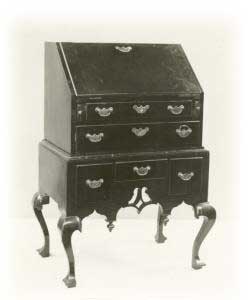American Queen Anne Furniture
Differences From The English
The major difference between the American style of Queen Anne and the original English Queen Anne furniture was the popularity in America of the cabriole leg with pad feet rather than the cabriole leg with the claw and ball foot as in England. Additionally pieces such as the highboy and lowboy remained in demand in America while in England they had long ceased to be made.

Queen Anne Highboy.
American Queen Anne furniture was more attuned to the demands of comfort, rather than mere show and display. Standard designs were altered to allow for upholstering, and there was a great variety of upholstery fabrics in use, most of it imported.
Popular new items included daybeds or chaise lounges, folding card tables, side chairs with vase shaped splats (fiddlebacks), and decorative tea tables with dished tops and cabriole legs.

Cabriole Legged Tea Table
Japanned and lacquered furniture remained popular, as it had in the William & Mary period. The publication of the "Treatise of Japanning and Varnishing" had had a huge effect on furniture design at this time.
Cabinet Making Centres
By 1720, when the American Queen Anne style of antique furniture had definitely evolved, a number of distinct cabinet making centres had grown up. Being endowed with the natural American individualism, and not being bounded by European guild systems of training apprentices in traditional techniques, these cabinetmaking centres developed their own regional characteristics and styles.

Queen Anne Mirror.
The major cabinetmaking schools at this time were in Boston and Newport in the north, New York and Philadelphia in the mid Atlantic, and Williamsburg and Charleston in the south.
Boston & Newport
The furniture makers of Boston were heavily influenced by English fashions, and this fact, coupled with a certain New England restraint, combined to produce furniture which was a disciplined and respectful copying of eighteenth century English designs.

Cabriole Leg Desk.
The famous Townsend and Goddard group in Newport made furniture with flowing, simple lines, the best of it being adorned with shell carving and block and serpentine shaped fronts. Their furniture of walnut and mahogany found a ready, worldwide, market.
New York
While the Dutch period in New York had formally ended in 1664 Dutch Colonial traditions continued to have profound influence. Bodice back chairs were especially popular in New York.
Philadelphia
The furniture produced in Philadelphia is so difficult to tell from similar English made models that even today antiques experts disagree over origins. Philadelphia made furniture bears little resemblance to period furniture made in other parts of the colonies.
The South
While many southern colonists still preferred to order furniture from England yet many pieces of distinction were produced in Williamsburg and Charleston in the Queen Anne style.
